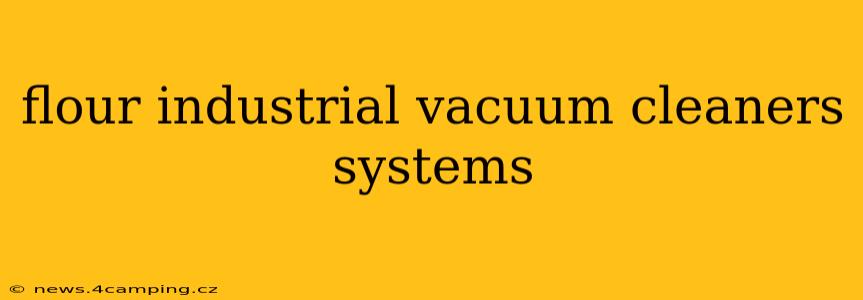Flour mills present unique challenges when it comes to maintaining a clean and safe working environment. The fine, powdery nature of flour makes it highly susceptible to airborne dispersion, leading to potential fire hazards, respiratory issues for workers, and product contamination. This is where industrial vacuum cleaner systems specifically designed for flour handling become crucial. These systems are not just about cleaning; they are about ensuring safety, productivity, and regulatory compliance within the flour milling industry.
What are the key features of flour industrial vacuum cleaners?
Flour dust is exceptionally fine and easily ignitable, demanding specialized vacuum systems to handle it safely and effectively. Key features include:
- Explosion-proof certification: This is paramount. Systems must be certified to prevent ignition of flour dust clouds. Look for ATEX or IECEx certifications, indicating compliance with explosion prevention standards.
- High-efficiency filtration: HEPA (High-Efficiency Particulate Air) or ULPA (Ultra-Low Penetration Air) filters are essential to capture even the finest flour particles, preventing them from re-entering the atmosphere. Regular filter changes are vital.
- Durable construction: Flour mills are demanding environments. The vacuum cleaner and its components should be robust and built to withstand heavy use and exposure to flour dust. Materials resistant to abrasion and corrosion are preferred.
- Powerful suction: Effective removal of flour dust requires a powerful suction system capable of cleaning various surfaces and equipment effectively.
- Easy cleaning and maintenance: Regular cleaning and maintenance are essential to prevent blockages and maintain efficiency. Systems with easily accessible components and straightforward cleaning procedures are ideal.
- Appropriate hose and nozzle attachments: Different nozzles and hoses are required for various cleaning tasks, such as cleaning overhead structures, machinery, and floors. A variety of tools should be provided for versatile applications.
What are the different types of flour industrial vacuum cleaner systems?
Several types of systems cater to the diverse needs of flour mills:
- Central vacuum systems: These systems utilize a central vacuum unit connected to a network of piping and inlets throughout the facility. This allows for cleaning various areas from a single, powerful unit. They are efficient for large-scale operations.
- Portable vacuum cleaners: These are smaller, more mobile units ideal for spot cleaning and localized dust removal. While less powerful than central systems, they offer flexibility.
- Wet/dry vacuum cleaners: These versatile machines can handle both dry flour dust and liquid spills, offering added functionality in a flour mill environment.
How do I choose the right flour industrial vacuum cleaner system?
Selecting the right system depends on several factors:
- Size of the facility: Larger mills will generally benefit from central vacuum systems, while smaller operations might find portable units sufficient.
- Specific cleaning needs: Consider the types of surfaces and equipment needing cleaning, the volume of flour dust generated, and the frequency of cleaning.
- Budgetary considerations: Central vacuum systems typically represent a larger initial investment than portable units.
- Regulatory requirements: Ensure the chosen system meets all relevant safety and environmental regulations for flour dust control.
How often should I maintain my flour industrial vacuum cleaner system?
Regular maintenance is critical for safety and efficiency. A schedule should include:
- Regular filter changes: The frequency depends on usage and the filter type. Always follow manufacturer recommendations.
- Inspection of hoses and nozzles: Check for wear and tear, blockages, or damage.
- Cleaning of the vacuum unit: Regular cleaning prevents blockages and ensures optimal performance.
- Professional servicing: Schedule annual or semi-annual professional servicing for thorough inspection and maintenance.
What safety precautions should I take when using a flour industrial vacuum cleaner?
Safety is paramount. Always follow these precautions:
- Proper training: Ensure all operators are properly trained on the safe operation and maintenance of the vacuum system.
- Personal protective equipment (PPE): Use appropriate PPE, including respirators, safety glasses, and gloves.
- Regular inspections: Inspect the system regularly for any signs of damage or malfunction.
- Emergency procedures: Establish clear emergency procedures in case of a malfunction or dust explosion.
By carefully selecting and maintaining a suitable flour industrial vacuum cleaner system, flour mills can significantly reduce the risk of fire, improve worker safety, enhance product quality, and achieve regulatory compliance. Investing in the right equipment is an investment in the long-term health, safety, and productivity of your operation.
